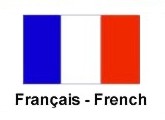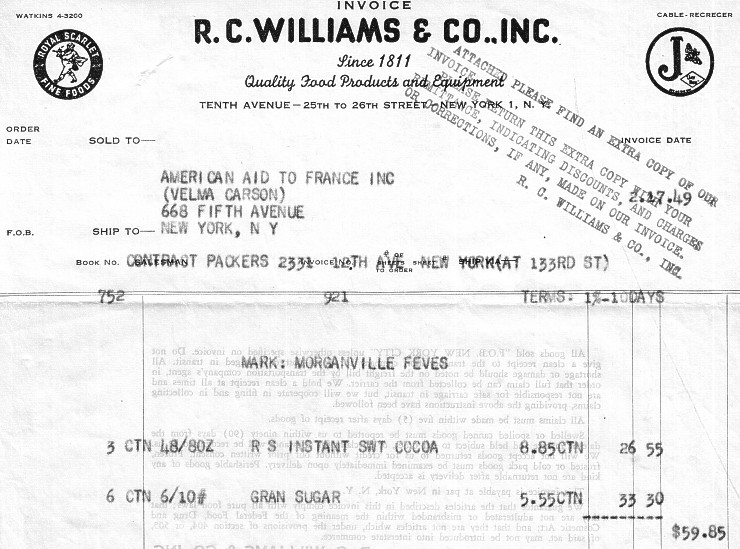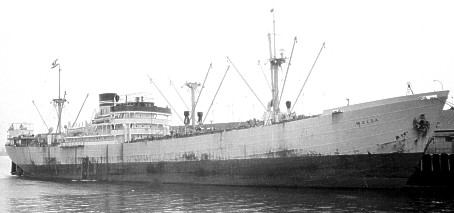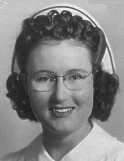Todd's letter to Carson about the three men they would be working with in Fèves kept interest high in Morganville.
Still, it would be hard to blame the French if they were a bit underwhelmed. It appears that from the time they had been
visited by aid officials during the previous March until shortly before the arrival of Christenson's chocolates that they
had heard nothing. The people of Morganville had rushed to send a shipment of clothing soon after Christenson's money
had been sent, but it languished in New York. American Aid to France, supported only by donations, appeared to have been
unable to load a suitable ship before the start of the dock strike on November 10. A second shipment of clothes
accompanied by shoes left Morganville a little more than a month after the first, but it too waited. So did the powdered
milk and lard.
The dock strike ended November 28, but it seems certain that Morganville's packages were still in New York at the end
of the year. As the French reporter who wrote the story about "Mr. Thotte's" visit observed, "it's rather a symbolic
gesture that marks the arrival of the American delegate."
At some time in the fall, most likely near the start of October, WRUL, a Boston short-wave radio station, broadcast to
Europe the recording of the pageant's play. But considering there was only one person living near Fèves who spoke
English, it is hard to imagine the transmission would have had much impact.
But the people in Morganville persisted. The December 30 Noel Ball was held in the gymnasium of the high school in
Morganville. It required formal dress with music once again provided by the Orb Pierson band. There was a small
admission fee and a Christmas tree to which donations could be attached. When all the bills were tallied and
subtracted from the income, $237.22 was netted. This was almost half the amount generated by the August pageant! It
would help to fund additional purchases.
Noel Ball in the Morganville high school gymnasium
Perhaps one of the most perceptive decisions the people in Morganville made was choosing to send seeds. Seeds would allow
the citizens of Fèves to grow their own fresh foods once the weather warmed. The seed packets were sent with the help of C.A.R.E. -
Cooperative for American Remittances to Europe. Later, when the agency began working in other parts of the world, "Europe"
was replaced by "Everywhere," allowing the same acronym to be used today.
The first item known to reach Fèves from Morganville after Christenson's chocolates was not material at all. In a
January 27, 1949 letter from Sonkin to Carson, he mentioned that noted Voice-of-America announcer Robert Franc, who
handled many of their broadcasts in French, had decided to make a French version of the play script. He
recruited students from a local college who were studying French to add various voices. The broadcast was on February
2, 1949. To make certain the broadcast was heard, Franc contacted Fèves mayor Berne.
Five days after the broadcast, schoolteacher Torlotting wrote to the Morganville committee:
Fèves
7 February 1949
Dear friends,
It is with great joy and, should we say with pride, that we learned that you had organized a radio broadcast in our
honor. This affects us deeply and we thank you most sincerely.
We are pleased that our ambassador in Washington has sent a letter to you that you have been kind enough to read on the
radio. Our gratitude is great to the governor of the State of Kansas and to the mayor of Morganville who were willing
to speak to us of their affectionate feelings. A special thank you to all that which were the organizer of this event
and all those who have collaborated.
The history of Morganville, so artistically represented, was very interesting. Now Morganville and Kansas is no longer
an unknown country for us and we can imagine what your village is like in the middle of vast plains between the two
oceans. We have a fair impression of this beautiful community that you built, despite the diversities of races and
backgrounds, thanks to your hard work, your love of music, and your church, a symbol of charity which unites God's
children that is open to all.
You have done well to remind us that even if the war did not cause physical destruction in your town, some of your sons
are not coming home. We will not forget and more than that, we will think of them in our prayers.
The reception of the broadcast was pretty good, but there are those who are jealous among the population of Fèves. They
are the ones who could not hear because their position is too low or because they could not find [the station]. And
then there was fading, that rascal who comes to remove a sentence at the most interesting point. For example: "Captain
Morgan who came from far away ...." From where? We could not understand. You can tell us in a future letter. But
perhaps you have recorded this broadcast? If there was opportunity to have these records, it would be a great
satisfaction for us to have, but on condition that this does not create too much of a burden on you and you have an
opportunity.
We reiterate our sincere gratitude and send you our kindest regards.
For the committee.
H. T.
school teacher
The first clothing shipment from Morganville sent in the early fall of 1948 arrived in Fèves on or about February 19 of the following year. The Christmas toys that had been sent by mail arrived two weeks later, mostly broken.
This February 17, 1949 invoice for cocoa and sugar was issued only two days before Morganville's September 22 clothes shipment reached its destination.
But letters sent directly between the villages traveled quickly. So the people in Fèves knew that they would be receiving
packages of seeds. The main concern was whether they would arrive early enough to be of any use.
Schoolmaster Torlotting again wrote to the Morganville committee on March 5.
Henri Torlotting, Teacher
Fèves (Moselle) France
Fèves, 5 March 1949
My Dear Mr. Roenigk,
I was so happy to receive your letter in which you told me of the sending of 5 packages of seeds. I wish to assure you
that [the] distribution will be made upon reception. I wish to express my joy on having received a "message" from
Morganville written in French. Several of your friends have written me, but in English. Here, my studies, are carried
on in French or German and [it is] unlucky I have ignored your language. Before 1939, it was law that the schools of
Lorraine teach German and I regret it very much.
On being understood, I will permit myself to make a rapid statement of the results obtained up to this day. You cannot
ignore that the friendship, or something similar, has made a great stir in our region. The press, the superior
authorities, everyone has praised Morganville. I wish, in all simplicity from the bottom of my heart, to thank you;
also for the grand lesson of charity and goodness. You were the first in our region and already other American towns
are following your example. Rapidly, I wish to describe to you the manifestations that have taken place in Fèves. On
the receipt of your package of candy, we sounded the horn on the day of Christmas as to organize a party of some sort.
The joy was immense while St. Nicholas distributed the candy. I made some pictures which are being sent to you.
The package of clothes and skimmed milk have arrived. Yesterday, a delegation of the UNESCO brought me a package of
toys, unluckily, broken.
The distribution of the clothes is almost complete. The powdered milk was distributed regularly all the 15 days. There
is yet enough for 2 months. I wish to thank you and want you to transmit my thanks and those of the people of Fèves to
our friends of Morganville. As soon as I can translate the other letters, I will reply.
Could you send me the address of the person of Morganville living with her husband in Paris? She could tell us of her
trip to Feves and perhaps it could be either a Thursday or Sunday, the day when I could be at her service. The
children of the school have made some writings concerning the gifts. Could I send them?
You can see the effects of the war. Before the war, there were 45 to 50 students. [Now 24.]
Sincere friendship to you and all your friends.
H. T.
Despite the transportation difficulties, the people in Morganville continued to ship more items for their sister city. In
addition to donated clothing, layettes, and linens, 200 lbs of apricot preserves, 70 lbs of cocoa, 180 lbs of sugar, 40 lbs of
cheese, and 30 lbs of liver pâté were sent. The second large shipment, including the goods on the receipt above, were carried
by the ship Molda.
Norwegian ship Molda
Near the end of Torlotting's March 5 letter, he mentioned a "person of Morganville living with her husband in Paris" and about the possibility of a visit to Fèves by them. That comment arose from Roenigk's February 28 response to Torlotting's February 7 letter, which contained the following paragraph:
One of our Morganville girls is now living in Paris and she and her husband intend [on] paying a visit to Feves sometime this spring. They take colored pictures and we hope to have some after their visit to your town of Feves.
The person Roenigk was referring to was Orb Pierson's daughter Billie. She had gone to Kansas City to train as a nurse. After graduation, she had met and married Iowa native Edwin Utley, a mechanic for Trans World Airlines. Although headquartered in Kansas City, TWA had facilities at major airports around the world, and at this time, Ed was stationed at Orly airport on the south side of Paris.
Billie Utley after nursing graduation in 1942
Roenigk did not respond to Torlotting's letter until April 18. No doubt a major factor in that delay was the language difficulty. He had been sending the letters he received to his son Ivan at the Naval Academy. Ivan would then translate them and send them back. Because Torlotting did not have a reliable translator available, Dan would sometimes send his response to Ivan, who would then translate his father's letter into French.





